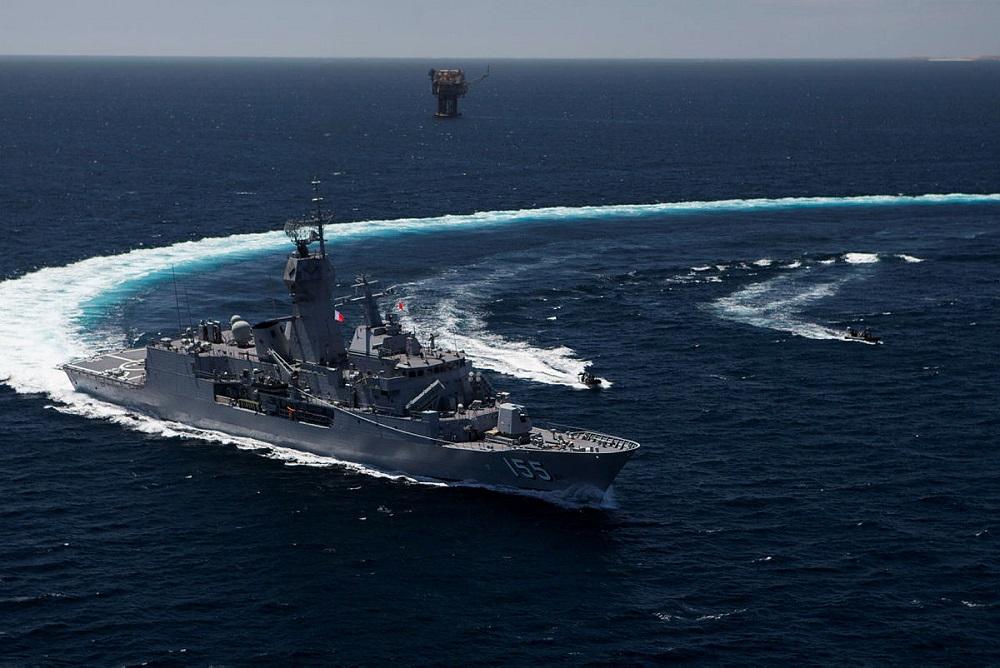The reaction to the defence strategic review (DSR) has largely focused on the recommendations to re-allocate defence funding, cut Land 400 from 450 to 129 infantry fighting vehicles in favour of long-range strike capability, develop a lethal surface fleet, and put a greater focus on autonomous air capability. However, the big challenges are hidden in the numerous references to ‘whole-of government’ and ‘whole-of-nation’ collaboration and solutions. This is particularly relevant to the much-needed upgrade of bases in northern Australia and complicated by the responsibilities of the myriad north-focused Commonwealth agencies—not to mention the state, territory and local governments, companies and communities—that a have a personal stake in the north.
The DSR highlights that Australia’s forward deployment line is across our northern maritime approaches from the Cocos (Keeling) Islands to our northern bases at Learmonth, Curtin, Darwin, Tindal, Scherger and Townsville. Several of those bases are in desperate need of redevelopment and others require upgrading.
It would have been disappointing for the reviewers to learn that most of the recommendations from the 2013 defence white paper relating to the northern bases haven’t been implemented. Even then it was noted that the ‘current disposition of the defence estate reflects the realities of history and Australia’s demography, coupled with a more recent emphasis on basing to support strategic priorities in the north of Australia’. Not wanting to dwell on why those early recommendations weren’t implemented (or indeed where the funding went), the DSR concludes that the network of northern bases should be ‘urgently and comprehensively remediated’.
However, our strategic defence can’t operate as disconnected ‘islands’ within regional communities.
A reference to the impact of recent severe flooding in the north highlights that Defence needs well-maintained, resilient civil infrastructure including ports and roads to operate effectively. While restoring infrastructure quickly following weather events is an enabler to effective defence operations, restoring infrastructure in a way that reduces the impact of future weather events is more to the point. That’s important for Defence but not its role.
The more significant point to appreciate is that our strategic positioning in our region is dependent on the north being economically prosperous and resilient. Understanding that the north is part of our region and ensuring it has robust physical and social infrastructure is more important than ever.
Corralling the parties with an interest in the north is challenging enough, but the key unanswered question is how do we do this better?
Defence tends to overwhelm partners in the north and at times heavily influence outcomes including in the design of local infrastructure, but without committing openly to using it. The Darwin ship lift design is a well-discussed case in point. The impact of this approach is that design specifications are enhanced, which in turn increases development cost. In the absence of an anchor client with an overt intent to use the infrastructure, the development won’t attract capital funding.
The government has agreed to most of the recommendations in the publicly released version of the DSR, but 13 were ‘agreed in principle’ and will largely be addressed in the national defence strategy to be delivered in 2024. There’s hope the development of the strategy will articulate the way forward. Time will tell whether this is another attempt to kick the can down the road in the way the 2013 northern base upgrades fell off the agenda.
In the past, Defence has been shy about articulating its strategic intent at the local level. The result is that local investors read between the lines or guess what Defence needs. The public version of the DSR provides plenty of guidance of what is and isn’t important. The big ideas will be coming thick and fast, and they will overwhelm even a large bureaucracy like Defence.
Implementation of the majority of the DSR recommendations relies on active involvement of not only other Commonwealth agencies, but also other levels of government and the private sector. Their good will to engage with Defence for the good of the nation will again be tested and it would be unwise to dismiss or downplay the challenges others have faced in their past dealings with Defence.
So, what needs to change? Implementation needs to get personal and local.
Defence invests huge efforts in recruiting and training its people. They represent one of the highest quality workforces in Australia and this capability needs to be better leveraged. Defence executive and star ranks can’t be everywhere. The assumption they have all the answers is flawed and should be challenged. Meaningful empowerment at the local level would fast-track implementation of the recommendations and deliver much-needed change.
There’s a reason most great innovations occur in small, nimble teams and start-ups. They are less likely to happen in department-run innovation hubs, which tend to become the tail wagging the dog.
Empowering small local teams runs counter to hierarchical structures of large organisations and requires people to operate in a far more organic manner, amplifying the regional and local focus. It may even have a positive impact on retention, particularly of younger members of the military. We know relationships matter, so give people the space to make them matter.
And the risk? Minimal. Most of the time people will do what you would’ve done. Occasionally they might do something that needs adjustment. And every now and then they will do something remarkable.
The north is recognised for its strong capability in innovation and Defence would do well to connect northern entrepreneurs with local Defence personnel to fast-track implementation of the DSR recommendations. The challenges are many and a few remarkable innovations won’t go astray!


